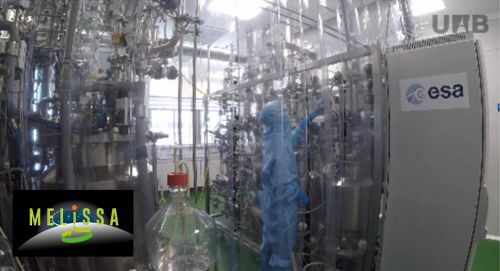
10/04/2019
10th Anniversary of the MELiSSA Pilot Plant: travelling to Mars is in progress near the Barcelona Synchrotron Park
10th Anniversary of the MELiSSA Pilot Plant: travelling to Mars is in progress near the Barcelona Synchrotron Park
The MELiSSA pilot plant from the European Space Agency (ESA), which is located in the engineering school of the Universitat Autònoma de Barcelona (UAB), the BSP strategic partner, works on a very ambitious and long-term project that celebrated its 10th anniversary last week.
During a round-trip voyage to Mars, a six-person crew would need about 30 tons of food, oxygen and water for the 1,000 days mission. This huge quantity would be drastically reduced if a closed loop system would recycle the CO2 exhaled and the waste produced by the crew in order to produce in return oxygen, water and food, etc.: this is the MELiSSA project.
This project started 30 years ago and is founded up to 60% by the ESA (5 million Euros per year). It involves 100 researchers from 30 organizations and 15 European countries. In this puzzle the UAB pilot plant, which was inaugurated in 2009, plays a central role. To be highlighted, the operation of three compartments of the MELiSSA Pilot Plant during a long term period under continuous and controlled operation was successfully achieved, demonstration of the scientific and technological capacities of the Consortium. These three compartments were a nitrification bioreactor, a microalgae photobioreactor and an animal isolator as a crew mock-up.
Let's see when humans can take the place!
During a round-trip voyage to Mars, a six-person crew would need about 30 tons of food, oxygen and water for the 1,000 days mission. This huge quantity would be drastically reduced if a closed loop system would recycle the CO2 exhaled and the waste produced by the crew in order to produce in return oxygen, water and food, etc.: this is the MELiSSA project.
This project started 30 years ago and is founded up to 60% by the ESA (5 million Euros per year). It involves 100 researchers from 30 organizations and 15 European countries. In this puzzle the UAB pilot plant, which was inaugurated in 2009, plays a central role. To be highlighted, the operation of three compartments of the MELiSSA Pilot Plant during a long term period under continuous and controlled operation was successfully achieved, demonstration of the scientific and technological capacities of the Consortium. These three compartments were a nitrification bioreactor, a microalgae photobioreactor and an animal isolator as a crew mock-up.
Let's see when humans can take the place!
More news
11/03/2015
Sustainability: the Barcelona Synchrotron Park focuses on birds and bats…
05/03/2015
Wastewater that produces green energy
26/02/2015
ALBA, CSIC and Alibava develop an X-Ray detector
20/02/2015
The pressure that makes conductivity higher: new record in the ICN2
11/02/2015
Presentation of the Big Data CoE Barcelona initiative
06/02/2015
Come investigate at the ALBA synchrotron: 2015 new call for proposals









